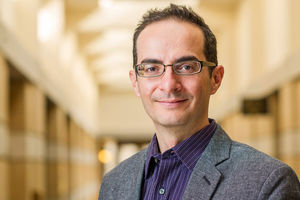 Ernesto Verdeja
Ernesto Verdeja
Ernesto Verdeja, associate professor of political science and peace studies and director of undergraduate studies at the University of Notre Dame's Kroc Institute for International Peace Studies, was invited to participate in the third meeting of the Global Action Against Mass Atrocity Crimes (GAAMAC) network in Kampala, Uganda, from May 23-25. The biennial GAAMAC meetings bring together representatives from governments, international and regional organizations, key United Nations offices, civil society and academia to discuss strategies for mass atrocity prevention.
Verdeja was one of only a handful of academics who were invited to participate in the gathering, which drew more than 180 attendees from over 60 different countries. Verdeja presented a workshop highlighting cutting-edge scholarship and research about the causes of mass atrocities and their prevention that could help to inform the work of practitioners at all levels of society. He also facilitated a panel discussion on the role of historical memory for mass atrocity prevention. Panel participants included Ms. Assumpta Mugiraneza from the Iriba Centre for Multimedia Heritage, Kigali, Rwanda, and Mr. Mofidul Hoque from the Liberation War Museum in Dhaka, Bangladesh.
Verdeja also found time to network and exchange knowledge with other expert attendees during open time between workshops and presentations.
“Attending GAAMAC meetings reinforced my interest in working directly with practitioners,” says Verdeja. “I’ve taken up a project working on mass atrocity forecasting and the need for that work was reinforced here. And it was a reminder to ask what can scholarship provide that is helpful and where can scholarship not make definitive claims?”
Verdeja returns to the Kroc Institute re-inspired to engage in research that further bridges the gap between scholars and practitioners in the quest to understand mass atrocity prevention and the markers of positive peace.
“Returning to Kroc, I have a newfound appreciation for the very sophisticated understanding of peace that we have here, in which peace is intimately tied to other concepts like justice and reconciliation,” says Verdeja. “Because of our interdisciplinary expertise at Kroc, I am able to articulate how atrocity prevention work can benefit from advances in current peace research and practice.”
About the Kroc Institute for International Peace Studies
The University of Notre Dame's Kroc Institute for International Peace Studies, part of the Keough School of Global Affairs, is one of the world's leading centers for the study of the causes of violent conflict and strategies for sustainable peace.
Contact: Ernesto Verdeja, ernesto.verdeja.1@nd.edu
Hannah Heinzekehr, Communications Program Director, hheinzek@nd.edu